
Did you know that there are over 200 Google ranking factors?
Google is by far the most popular search engine on the planet.
It dominates other search engines like Bing and Yahoo with over 5.14 billion searches taking place on Google each day.
So, it’s no surprise that you’d want to rank higher on Google search results.
But with SEO (search engine optimization) changing every now and then, it can be hard to implement and keep up with all the changes.
So, you might wonder: which Google ranking factors are important for your website?
In this article, we’ll take a closer look at 10 factors that can help you improve your rankings.
Let’s dive right in…
Most Important Google Ranking Factors
When it comes to getting a higher ranking, many website owners would want to follow all the ranking factors.
But what if we told you that you just need to focus on a few of these factors?
To help you out, we’ve shortlisted the most important ranking factors you should ensure on your website.
1. High-Quality Content
You must have read in several places that content is king.
And in the case of Google ranking factors, it’s definitely the king.
If you can create content that’s unique, fresh, and helpful for users, then Google will rank it higher on its search engine page results (SERPs).
Google pays special attention to your content quality. No matter how optimized your website is, if your content is not valuable, then you can’t expect higher rankings.
So, what’s content quality for Google?
Original, Unique, and Valuable Content
Google gives preference to content that’s new and unique. You would want to create posts that answer your reader’s questions, provides value, and is original.
If your content is duplicate or similar to other webpages, then it could cause a negative impact on your SEO. For starters, Google might not index and rank your page.
And if you regularly publish duplicate content, Google will slow down the crawling rate of your website.
So, when you’re creating content, make sure it’s different and better than other websites that are ranking for the search term.
Up to Date and Fresh Content
Another way you can boost your content quality is by keeping it fresh and updated.
By regularly updating your posts and adding new information, you’re sending a positive signal to the search engine.
Content freshness plays a big role if you cover topics that involve news or trends.
For such topics, Google prefers pages that provide the latest information.
For instance, if you’re writing about the global health crisis, you would want your content to contain recent news and researches. And a simple way of finding the latest information to keep your content fresh is by using Google Trends.
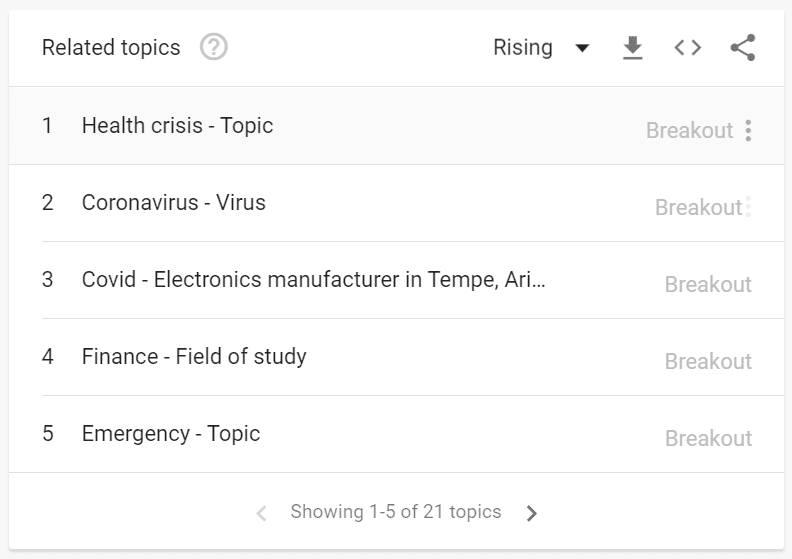
Just enter your search term in the tool and look at Related Topics. These are trending queries that can help you add value to your posts.
Content-Length
One of the questions we’ve come across a lot of times is whether content length a part of Google ranking factors?
And the answer is, yes.
According to different studies, content length has an impact on where you rank on the search results. On average, posts with 1,890 words rank on the first page.
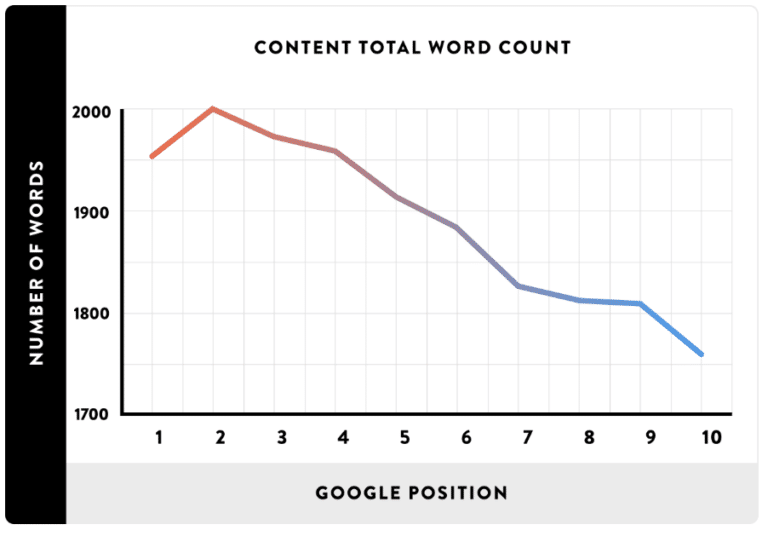
That said, there’s no hard and fast rule where you should stick to a word limit while writing.
A better way of looking at this is to create content that has depth and covers a topic in great detail. That’s because Google prefers pages that fully answer a user’s question and provides detailed solutions.
Content Structure and Organization
When it comes to content quality, your blog posts should be well organized and structured. This makes it easier for your visitors to read your posts and easily find solutions to their problems.
To improve the structure and organization of your articles, you can use multiple headings and subheadings (H2, H3, H4, and so on) to group your content together.
You can also use HTML tags for bullets (ol) and number lists (li) to further organize your content. This is beneficial as Google picks up these lists and shows them as featured snippets for different keywords.
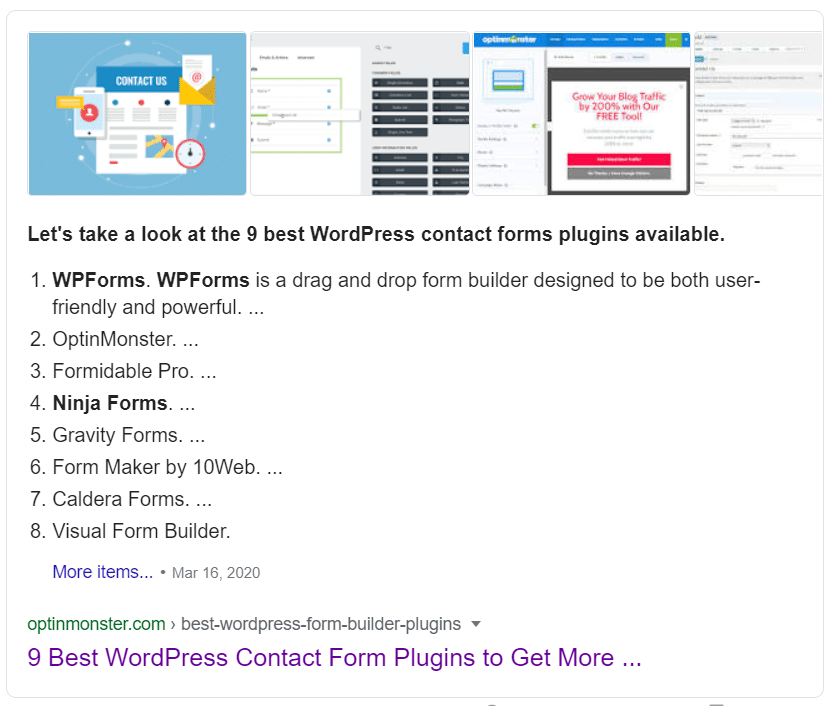
And don’t forget to look at the flow of your article and see which section should come first.
So, by working on your content’s structure and organization, you’ll increase its readability. As a result, you’ll improve the user experience of your site, which indirectly improves your chances of ranking higher on Google.
2. Backlinks
After content, the second most important Google ranking factor is backlinks. They are an important part of Google’s ranking algorithm and it’s how Google crawler finds your website for indexing.
In fact, content and backlinks go hand in hand, as webpages without any backlinks hardly get any organic traffic.
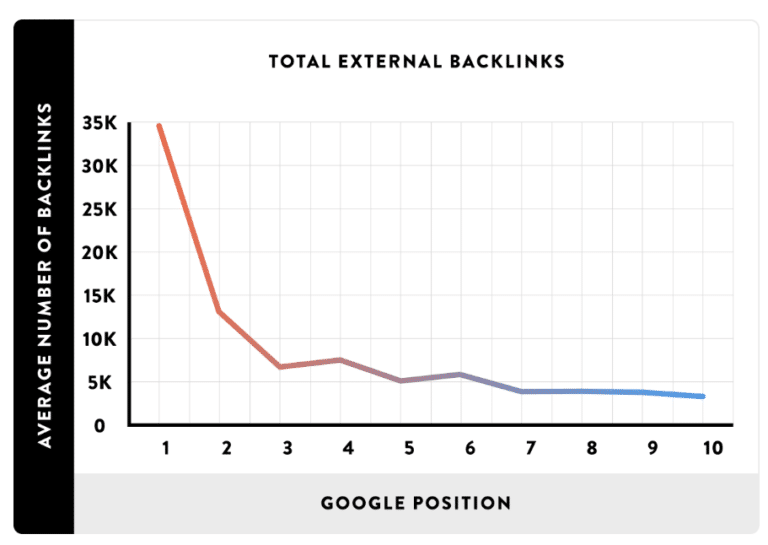
So, how are backlinks important for your site’s SEO?
Backlinks or inbound links are like a vote of confidence for your website. Google adds all those votes together and checks if your website deserves to rank in the top 10 results.
If you can get backlinks from high authority websites, you can boost your chances of higher rankings. That’s because by acquiring these links, you’re sending a signal to Google that your content is trustworthy as different websites can vouch for it.
3. Search Intent
Another crucial ranking factor for Google is matching the search intent of your content. Search intent is basically what a user is looking for.
Every keyword is different on Google and you need to understand the why behind that search query.
For example, if someone searches for the best WordPress themes, you’ll see that the results in the top 10 include listicles.
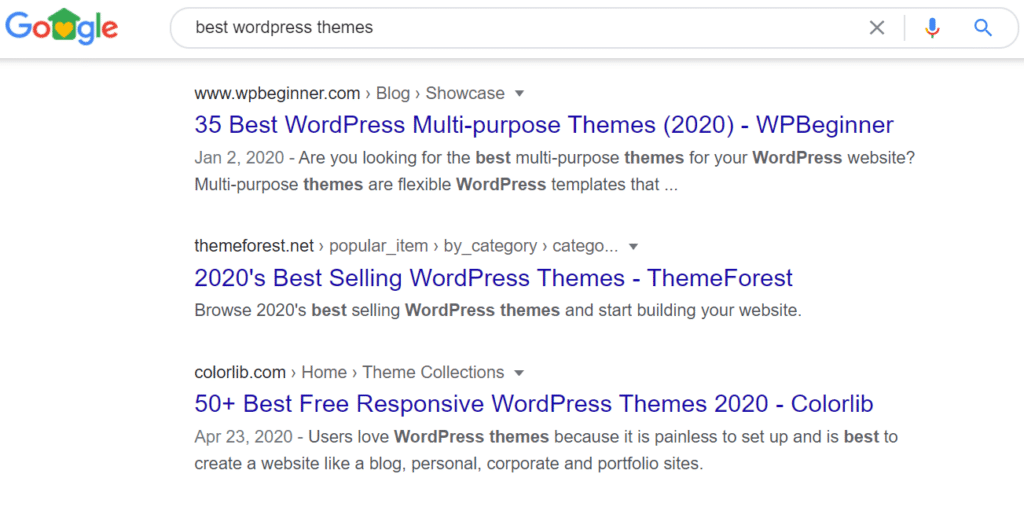
Here’s another example. If you search the keyword, make banana bread, you’ll notice that the results consist of recipes and how-to articles along with videos.
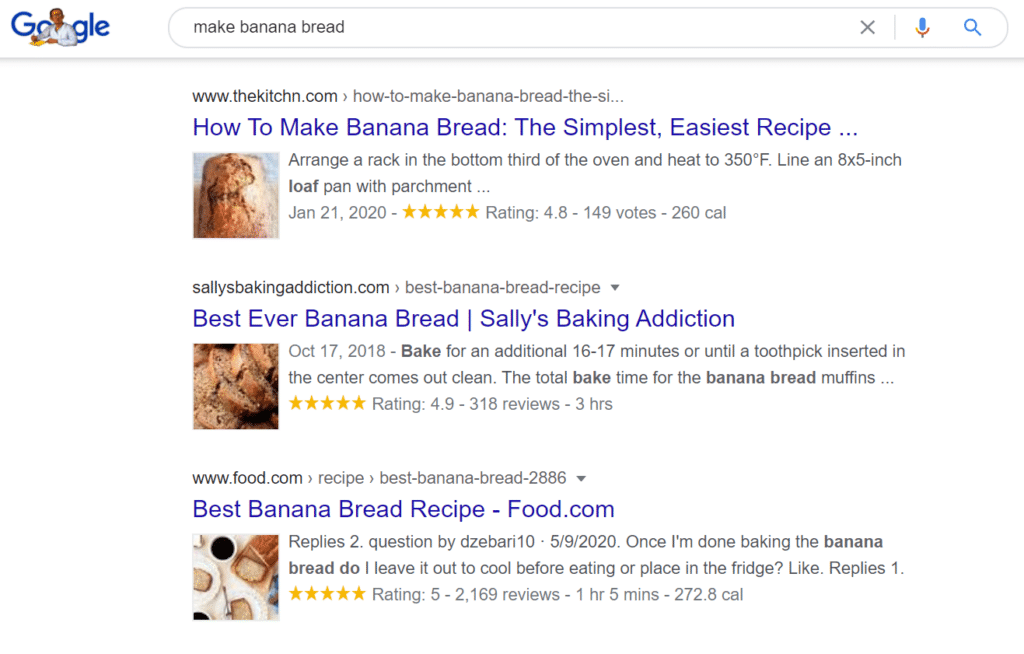
So, if you were to create content on either of the topics, it’s important to match the search intent and create the right type of content.
Now, search intent could vary based on content format and style.
For instance, in some cases, Google will display only videos and infographics in the top results. This means you should be creating a video or an infographic if you want to rank for those keywords.
Besides that, search intent also shows where your visitors are in the buyer journey.
Are they looking for basic information about your products, do they want a tutorial like a how-to article, or are they in the final stage and ready to make a purchase?
By matching the search intent, you can answer these questions and create content that people are looking for.
4. Website Loading Speed
Among 200 different Google ranking factors, another factor you should focus on is your page speeds. That’s because starting May 2021, Google will make website loading speed a part of its Core Web Vitals.
These are a set of factors that Google considers are important for user experience on your site. It will look at the speed, responsiveness, and how quickly different elements like fonts and images load.
Now the goal here isn’t to beat your competitors with milliseconds of load time. But you should pay attention to how fast a page loads for your users.
Google wants your website to load quickly and provide a great user experience for your audience.
To check your website loading speed, you can use the MonsterInsights Site Speed report.
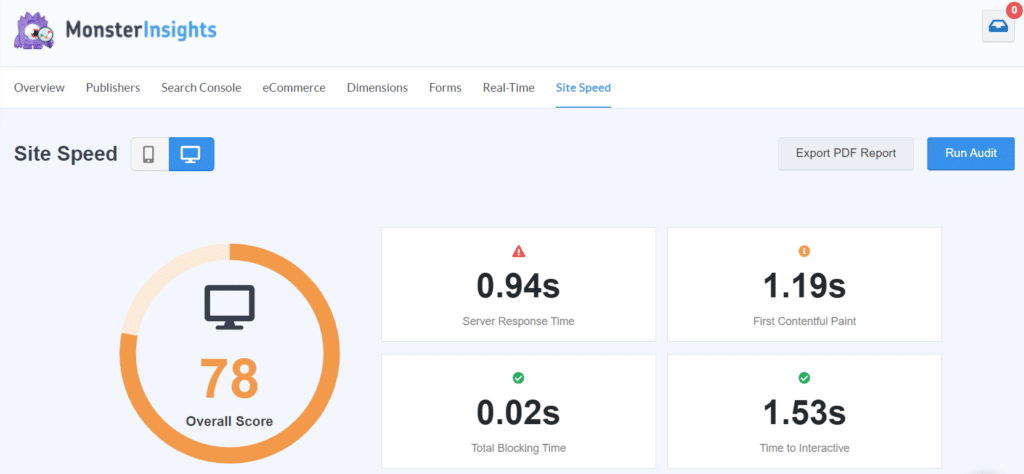
It will analyze your website, display a score for mobile and desktop, show important metrics about your page load times, and highlight suggestions to make your site even faster.
For instance, one of the ways to improve your WordPress website loading speed is by using a CDN (content delivery network). It makes sure that your webpages load without any delay for your users around the world.
Besides that, you can also take a look at these simple tips to speed up your WordPress site’s performance.
5. Mobile Friendliness
Along with speed, another thing to look at is whether your site mobile friendly or not.
Ever since Google has gone mobile-first in 2019, it’s key that your website is mobile responsive. Mobile-first means that Google will now use your website’s mobile version for indexing and ranking.
Previously, Google would use your desktop as the primary version for indexing. But with 3.7 billion mobile internet users in the world, it’s no surprise that Google has made this shift.
So, if you want to boost your rankings, now is the best time to make your website mobile-friendly.
You can start by picking a WordPress theme that is mobile responsive.
Or you can use different plugins to make your WordPress site mobile friendly.
6. Domain Authority
The next Google ranking factor you need to work on is your website’s domain authority (DA). It’s a ranking metric that shows your site’s expertise about a particular topic and its ability to rank on search engines.
Domain authority is created by Moz and it assigns a score between 1 and 100. Higher your domain authority, higher are your chances of ranking on Google.
Now there are different ways you can boost your site’s authority. You can start by acquiring high-quality backlinks. But at times, having a lot of backlinks doesn’t guarantee higher rankings.
This is where you need to create amazing content that’s focused on your industry.
To get an idea which topics your visitors like, you can use MonsterInsights, the best Google Analytics WordPress plugin, and uncover the most popular pages on your website.
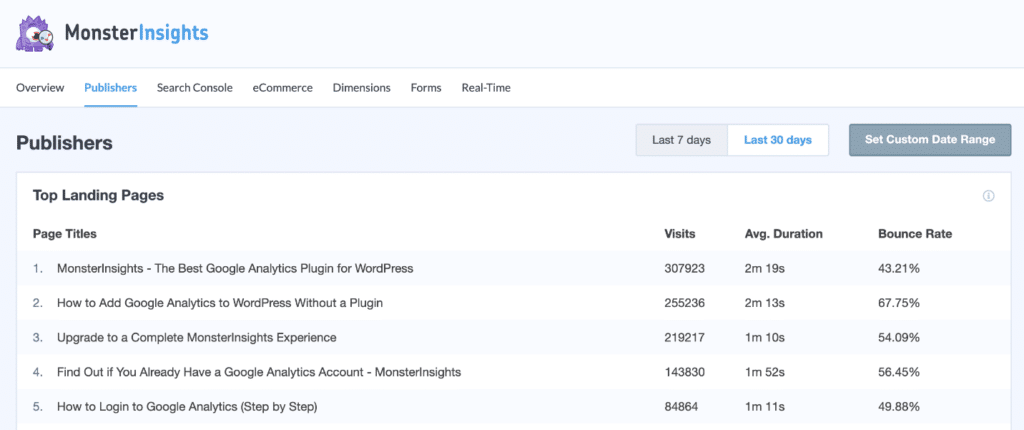
Then create high-quality content around these topics to increase your topical authority.
As a result, Google will start to recognize your site as an expert on the topic, boost your domain authority, and will start to rank your pages in the top 10 on search results.
7. Keyword Optimization
Besides creating content and getting backlinks, one of the most obvious ranking factors is the use of keywords on your website.
Keywords are the search terms users use to look up things on Google. So, it’s important that your website contains the keywords your audience is searching for. That way, Google can bring up your page in its search results.
To ensure that your website is keyword optimized, here are a few tips:
- Title Tags – Include your target keyword at the start of your posts SEO title tags.
- Meta Description – Write irresistible meta descriptions and add your focus keyword so users know what your page is about and click on it.
- Image Alt Text – Since Google cannot read images, you can add your keywords in the image alt text section to tell what’s the visual about.
- Anchor Text – Google uses anchor text to find out what’s the page about, so you can use your keywords for anchor text when linking your pages.
- Use LSI Keywords – Besides your primary keyword, there are other related terms that people search for and these are called LSI (latent semantic indexing) keywords. By including these on your page, you’re helping Google figure out what’s the content about.
- Avoid Keyword Stuffing – Keyword optimization doesn’t mean only including your primary search term over and over again. That’s called keyword stuffing and it’s not a good SEO practice. Try to include your head search term a few times and then mix things up with different variations
- Include Keywords in H2 and H3 – You can further improve your content’s SEO organization by using keyword variations or LSI keywords in H2 or H3 of your post.
- Add Keyword in URL – Another keyword optimization practice is to include your keyword in the URL of your post.
8. Website Structure
While keyword optimization is important, another factor you should look into is your site’s structure, especially if you’re just about to launch a website.
Your website’s architecture is important from a crawling and indexing perspective. It allows Google crawlers to easily find your website and its pages.
And to improve the site’s structure, you can start by creating a sitemap in WordPress. A sitemap contains all the important pages that you want the search engine to know about.
It helps Google crawler to easily navigate through your website, discover new content, and index your pages.
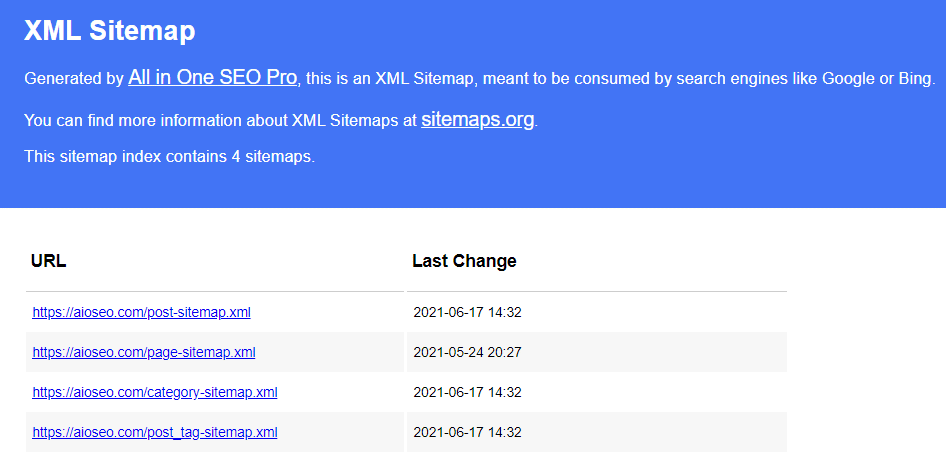
Another way you can help Google to index your website is by optimizing your WordPress robots.txt file.
A robots.txt file provides a pathway for Google bots and tells them how to crawl and index your website. It helps to point out which pages search engine spiders should crawl and which it should not.
As a result, you’ll save crawl quota and the bots will not go through pages that are not necessary, like the admin page.
9. Website Security
Along with website architecture, your site’s security is now a key Google ranking factor. This is where you need to ensure your site is now on HTTPS, as it encrypts the data between your website and your user’s browser.
Google confirmed in 2014 that HTTPS is now a ranking signal.
So, if your site doesn’t have SSL certificates and is on HTTPS, then now would a good time to update.
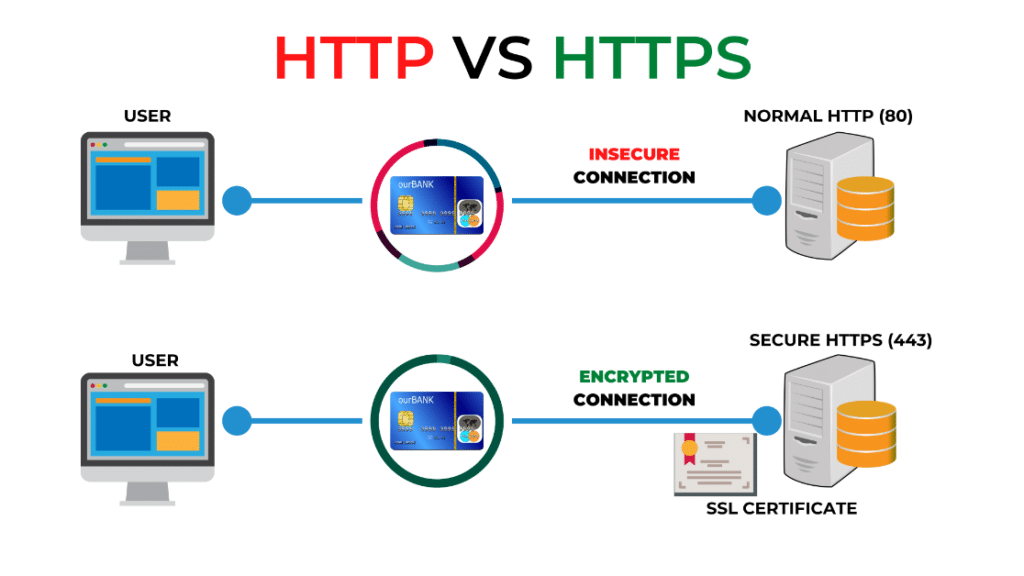
10. User Experience
The last Google ranking factor we have for you is the overall user experience of your website. Now there are a lot of things that contribute towards a good user experience.
But how does Google measure this?
It uses an artificial intelligence program called RankBrain, which incorporates other ranking signals like:
- CTR (click-through-rate) – It’s the percentage of users that click on your website link in the search results. By improving your CTR, you can boost your rankings, especially if you’re stuck in the top 5 results.
- Bounce Rate – Having a high bounce rate isn’t good for your site. If a high number of people click on your site and then hit the back button without interacting with your website, Google will think the page is not relevant and won’t rank it.
- Dwell Time – This measures how long a visitor stays on your site after coming from Google search results. The higher the dwell time, the better it is.
While these are some important ranking signals Google’s RankBrain uses, there are many more. But since most of them are speculations at this stage, we recommend you stick to the 3 factors we’ve discussed above.
And that’s it!
We hope you liked our article on the most important Google ranking factors for your website. Be sure to check out some of the other articles on our site.
Source: https://www.monsterinsights.com/google-ranking-factors/




